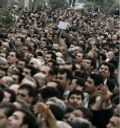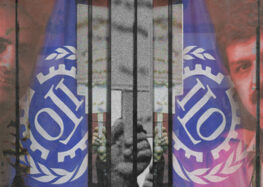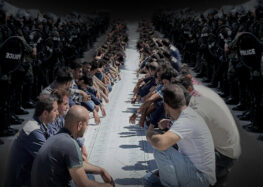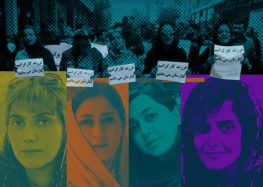Workers’ Rights
 Iranian workers and teachers are denied many protections of basic workers rights, as defined and articulated under longstanding international labor standards. Iranian workers are deprived of such fundamental rights both under Iranian labor law and in practice.
Iranian workers and teachers are denied many protections of basic workers rights, as defined and articulated under longstanding international labor standards. Iranian workers are deprived of such fundamental rights both under Iranian labor law and in practice.
According to several conventions of the International Labor Organization(ILO), of which Iran is a member, workers in each country are entitled to legal protections such as freedom of association and protection of the Right to Organize (Convention 87); the right to organize and to collective bargaining (C98);the abolition of forced labor (C29, C105); the abolition of child labor (C138, C182); the prohibition of employment and occupation related discrimination (C100, C111); and standards regulating wages and conditions of work (C1, C14, C95, C106, C131, C132, C155). These conventions constitute and elaborate a minimum set of internationally accepted standards.
As a member of the ILO, Iran is obligated to respect and institute these standards. Iran has ratified 13 ILO conventions, but not the core conventions relating to freedom of association (C87) and the right to organize (C98). Nonetheless, in its 1998 Declaration of Fundamental Principles and Rights at Work, the ILO states that “All members, even if they have not ratified the Conventions in question, have an obligation arising from the very fact of membership in the Organization, to respect, to promote, and to realize” these core conventions(emphasis added). ILO’s Committee on Freedom of Association is charged with investigating complaints relating to its observance by member states.
Iran is one of the oldest member states of the ILO, having joined at the time of its founding in 1919. Iran’s first independent trade unions were founded more than a century ago. But today, Iranian workers are still unable to form independent trade unions, a right denied both within Iran’s labor code and de facto repressed by the government in action. The government routinely arrests and prosecutes workers demanding their most basic rights, such as demands for wages unpaid, sometimes for periods as long as 36 months. Security forces often attack peaceful gatherings by workers, harass their families, and even kill them, as happened during a gathering by copper miners in Shahr Babak, near the city of Kerman, in 2004.
Two leading trade unionists, Mansour Osanloo and Mahmoud Salehi, are currently in prison. Another one, Majid Hamidi, recently the target of an assassination attempt, is hospitalized. In addition to being imprisoned and fined, eleven other workers were flogged in February 2008 for the crime of participating in a peaceful gathering to commemorate International Labor Day, May 1st.
Although Iran’s constitution (Articles 26 and 27) recognizes freedom of association and assembly and Iran’s civil law requires ratified international treaties to be recognized equivalent to domestic laws, Iran’s Labor Law explicitly contradicts these legal obligations. Section 6 of the law addresses workers organizations in such vague terms that for nearly twenty years since its adoption, Iranian workers have not been able to freely associate with independent organizations.
According to the Labor Law, workers may only participate in three types of organizations: Islamic Labor Councils, Trade Associations, and Workers Representative for workplaces with less than 35 workers). The law explicitly encourages workers to associate with Islamic Councils, which are effectively controlled by management in workplaces. It also stipulates that only one of the above organizations may exist in a given workplace. These legal restrictions on membership and pre-definition of the allowable types of workers organizations are in direct breach of international standards and the Iranian constitution.
In addition, Islamic Labor Councils, the most common type of labor organization, are explicitly defined in Iran’s Labor Law as ideologically-centered entities. They are not focused on promoting workers rights and are incompatible with the concept of independent unions. Furthermore, workers’ membership in these Councils is subject to a vetting process, controlled by the Labor Ministry. According to Article 138, the Supreme Leader is entitled to appoint a representative in each type of workers organization. The law even forbids formation of these organizations in large industries, such as the petrochemical industry, unless the cabinet issues a special directive. Article 191 empowers the Supreme Labor Council to propose labor-related legislation to the cabinet, bypassing the parliament. Using this loophole, rug-weaving workshops and workplaces with under five employees are exempt from provisions of the Labor Law.
Over the past three decades, the track record of Islamic Labor Councils and their central body, the Supreme Labor Council, has been in favor of management and its policies. These councils are controlled under the umbrella of the Workers House.
In this context, workers have been actively seeking to form independent unions that aim at implementing international labor standards. Their movement gained strength starting in 2001, when several attempts were made to launch independent organizations. The goal of the Iranian workers movement is to educate workers and raise their awareness of their rights, as well as to advocate for legal reforms to make the Labor Law congruent with international law.
Three notable examples of recently established independent organizations are: the Syndicate of Workers of Tehran and Suburbs Bus Company, Teachers trade associations, and the Coordination Committee for Establishment of Trade Unions. Security and intelligence forces have routinely and violently attacked peaceful gatherings and meetings organized by these entities.
In 2005, during an attack on a workers meeting, Mansour Osanloo, a leading trade union activist, suffered serious injuries including knife wounds. Osanloo had stitches in his neck and tongue as a result. . In January 2006, security forces arrested nearly a thousand members of the Syndicate of Workers of Tehran and Suburbs Bus Company, attacked some of their homes, beat their families, and even detained the wives and children of the leading members, to prevent a planned strike. Since then, most members of the Syndicate’s central council have been targets of prosecution and imprisonment. The Syndicate’s leader, Mansour Osanloo, is currently serving a five- year sentence, while he suffers from eye injuries due to earlier beatings, and is in danger of going blind. Fifty-four members of the Syndicate have been fired from their jobs and are prosecuted in courts for their peaceful activities.
Another manifestation of the workers movement is secondary and primary school teachers’ attempts to organize and collectively bargain. In March 2007, thousands of teachers held several protests in front of the Parliament, demanding attention to their grievances including prevalent discrimination against them as compared to other state employees and low wages forcing them below the poverty line. In response to this attempt to gain the attention of members of parliament, security forces violently attacked them. Since then, the leading organizers have been prosecuted in unfair trials and sentenced to as long as five years in prison. The government has harshly punished many of teachers involved by firing them, forcing them into early retirement, cutting wages, or suspending them. Teachers actively organizing independent associations have been exiled away from their hometowns.
The teachers’ only independent publication, Ghalam Moalem [Teacher’s Pen], was attacked and ransacked by security agents, and its reporters and managing editor have been put on trial. The Interior Ministry has declared all teachers associations illegal and is actively preventing their meetings from being held.
There are many other instances of official prosecution and persecution of labor activists. Mahmoud Salehi, a bakery worker from the city of Saqez, is in prison because of his persistent attempts to celebrate May 1st. The court prosecuted him for “acting against national security.” He suffers from serious medical complications and his life is in grave danger. Intelligence agents also have summoned and temporarily detained Reza Dehghan, a founding member of the Painters Syndicate, and an advocate for construction workers. In the fall of 2007, Majid Hamidi, a well-known workers rights activist, suffered serious injuries to his spinal cord, following an assassination attempt by unknown gunmen. He is currently hospitalized. Eleven workers in Sanandaj were flogged in February 2008 for participating in a peaceful gathering on May 1st.
In the absence of effective independent organizations to protect workers’ rights, the privatization of state owned companies is accelerating in a non-transparent environment, resulting in closure of many of them for quick profits by new owners through the sales of assets and land. As a result many workers are becoming unemployed and are forced to accept work under temporary contracts or even without contracts, so the employers can evade the provisions of the Labor Law.
Workers public protests are routinely met with violent repression by security forces. A notable example is the plight of the workers of Rasht Electric, the largest manufacturer of electrical and electronics products in the Middle East. For over three years, the workers at Rasht Electric have been seeking respect for their basic rights through peaceful gatherings and protests, to no avail. Other large scale workers protests include those at Haft Tapeh Complex in Ahvaz, and the textile workers in Kurdistan. In all these cases, security forces have violently broken up workers’ gatherings.






